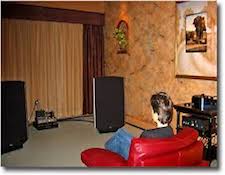It’s the time of year for saving money!
Buying a car is fairly straight forward. Anyone not already possessed with a definitive automobile choice may simply visit a car lot, test drive something, discuss price and pretty much know if that car makes the short list. Having this sort of knowledge allows the buyer to decide if they want to do any further research on that brand and model, dismiss it all together or simply buy the car. If only high performance audio should be so simple.
 Because of the number of manufacturers, different types and technology of equipment, the differing ways various components sound in any given system, the continuing scarcity of dealers, and, due to financial burdens, the lack of a wide variety of demo equipment at most dealers, choosing an audio system represents a compendium of decisions. Decisions at best difficult to make.
Because of the number of manufacturers, different types and technology of equipment, the differing ways various components sound in any given system, the continuing scarcity of dealers, and, due to financial burdens, the lack of a wide variety of demo equipment at most dealers, choosing an audio system represents a compendium of decisions. Decisions at best difficult to make.
Some may stick with one manufacturer of any one or group of components so the choice essentially becomes when, or if to spend, how much to spend, and what components within the brand to choose. Such decisions are probably the easiest to make because the choices are very narrow in scope.
For the rest of us, we have to wrestle with the indecision of what to buy. Do we choose an integrated amp, a stereo amp or mono blocks? Do we want to use a preamp in our digital only system? Do we want an all tubed system, an all solid state system, or a mixture of both? I’ve always liked solid state as opposed to tubed components. It’s always been a personal choice. However, six months ago I changed my phono stage to a tubed version and I absolutely love the sound as opposed to the solid state phonostage I previously had. Should I now look to replace my solid state amp and preamp with a tubed version? Were I to do so without a lot of testing and homework, would I ultimately live to regret my decision? These types of questions and many more haunt our buying choices.
 Many audiophiles turn to any of a variety of outlets to help them make some semblance of an informed decision. In the web sites I usually follow, it is not uncommon to see questions from readers on a comparison of a reviewed component to something in which the reader is possibly interested. A reviewer will post a review on an amp, for instance. A reader will write in and ask the reviewer how the reviewed amp compares to one or more brands the reader is considering. Typically, the reply from the reviewer will contain two things – one, some basic differences between the various components – providing the reviewer is familiar with all the brands mentioned – and two, a caution to the consumer to actually hear all of the components for themselves and then make a decision. Generally speaking, reviewers don’t make absolute declarations especially when asked by a reader to do exactly that.
Many audiophiles turn to any of a variety of outlets to help them make some semblance of an informed decision. In the web sites I usually follow, it is not uncommon to see questions from readers on a comparison of a reviewed component to something in which the reader is possibly interested. A reviewer will post a review on an amp, for instance. A reader will write in and ask the reviewer how the reviewed amp compares to one or more brands the reader is considering. Typically, the reply from the reviewer will contain two things – one, some basic differences between the various components – providing the reviewer is familiar with all the brands mentioned – and two, a caution to the consumer to actually hear all of the components for themselves and then make a decision. Generally speaking, reviewers don’t make absolute declarations especially when asked by a reader to do exactly that.
Something else I see quite often are requests for recommendations made by consumers on audio forums. One respondent will post a comment that states an indecision between two or more products in an individual class. They might even describe their system, what type of music they prefer, and any related information to aid the audiophile world at large in making some measure of a suggestion.
From there, the responses can be all over the board. If the questioner lists a choice of three speakers, for instance, there may be no real consensus of which of the three is preferred. Most interestingly, and this is almost always the case, there are any number of recommendations for speakers that were never one of the original choices. For example, if I ask for some guidance from audiophiles on a web site for an opinion of three speakers, how do I realistically move forward if none of the reccomendations match the ones I was considering?
I also find it very interesting, and perhaps even telling, that anyone should cast their fate to the winds of actually making a product choice by enlisting the opinions of strangers. In theory I suppose it makes some sense. The goal is to have someone respond with actual, firsthand, definitive knowledge of the product in question, list what they liked about it, or what they disliked if that applies, then pass judgment on the possibility of that particular component as being worthy of purchase. For some, this type of construct will be perfectly acceptable. For still others, taking such advice from strangers on the Internet may seem terribly risky. Regardless, many readers of forums ask for opinions so for some, the advice must prove useful.
 This all leads to the incontrovertible conclusion that making a choice of what to purchase in an expensive high performance audio system is becoming increasingly difficult. Disposable income is consistently hard to come by, actually hearing a desired component is not always a certainty due mostly to lack of demo availability, and while I can’t speak for anyone else, I’m hesitant to plop down a check for an audio component based exclusively on the advice of strangers on the Internet. But that’s just me.
This all leads to the incontrovertible conclusion that making a choice of what to purchase in an expensive high performance audio system is becoming increasingly difficult. Disposable income is consistently hard to come by, actually hearing a desired component is not always a certainty due mostly to lack of demo availability, and while I can’t speak for anyone else, I’m hesitant to plop down a check for an audio component based exclusively on the advice of strangers on the Internet. But that’s just me.
So how do we fix this problem? It probably begins with doing a lot of homework. Utilize all available sources to aid the decision making process. But in the end, the recommendation so very often given by audio reviewers is perhaps the sagest advice – listen for yourself in your own system and then decide. Maybe not the perfect solution, but then again, what is?








